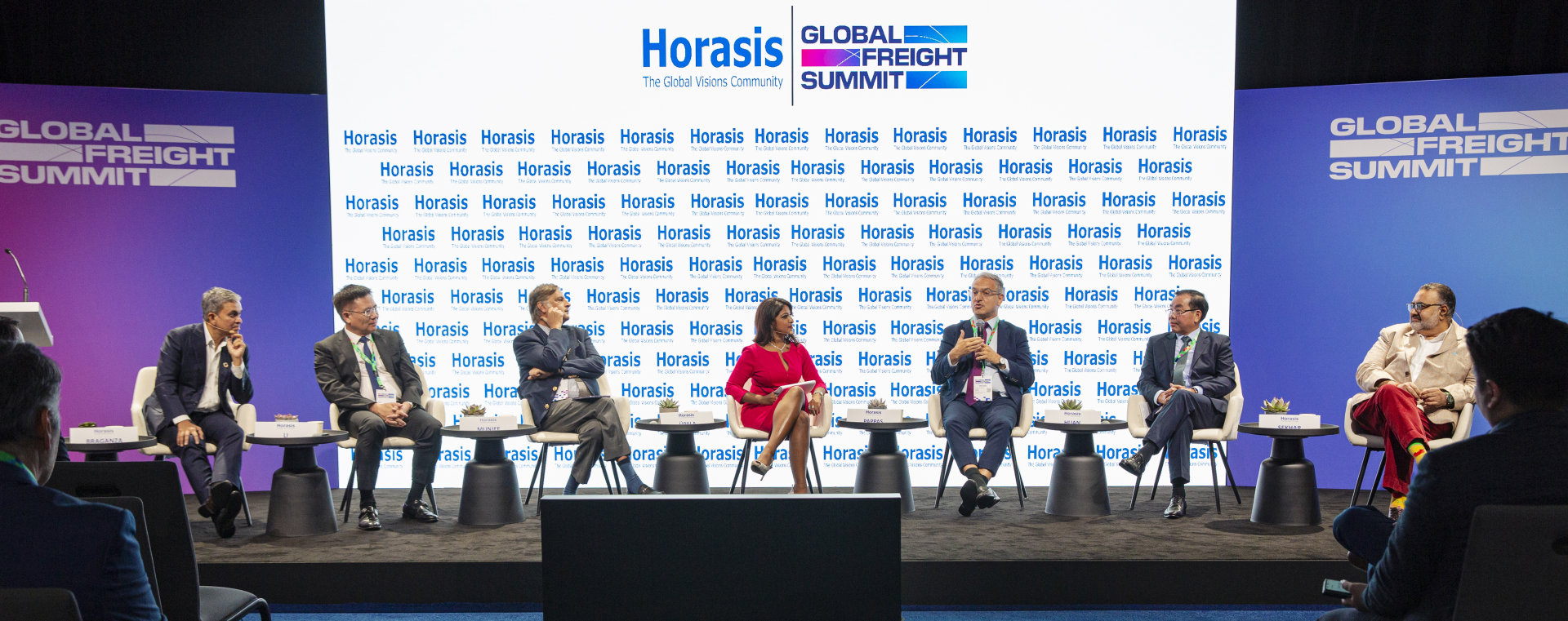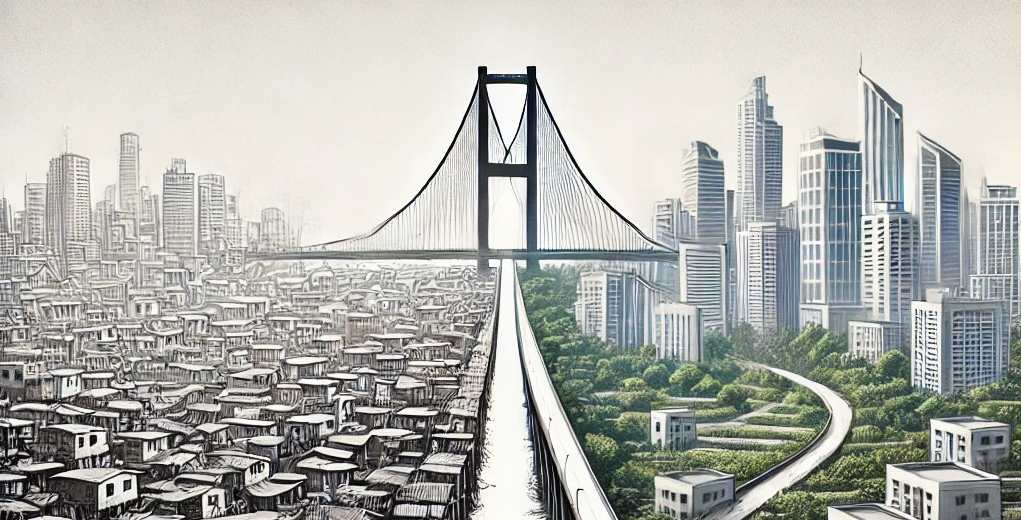Horasis Asia Meeting 2024 – Report
The ninth Horasis Asia meeting took place over 18-19th November in Dubai, UAE. It was co-hosted by DP World and held in parallel with the Global Freight Summit in the Dubai Exhibition Centre at Expo City. The Horasis meeting has become the go-to meeting for Asia Pacific business leaders to meet their global counterparts and to listen to government and business officials discuss matters of significance at present and into the future. The meeting attracted over 200 delegates from government, business and civil society world-wide, partly aided by its accessibility – the UAE, and Dubai in particular, prides itself on being at the center of the transport world’s routes.
Mike Bhaskaran, Group Chief Operating Officer, DP World, UAE welcomed participants to the 9th annual Horasis Asia Meeting, presenting an overview of the umbrella Global Freight Summit and the Horasis part of it. He stressed Dubai’s role as the world’s emerging logistics, commercial and cultural hub. He also illustrated his vision on how to further link up Dubai with its trading partners from Asia. He also highlighted innovations in digitalization and AI that present the most promising areas for mutual growth and investment.
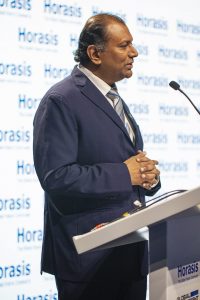
Mike Bhaskaran, Group Chief Operating Officer, DP World, UAE, during the Opening Ceremony
The first plenary discussion of Asia and World Economic Outlook was chaired by Tala Michel Issa, Senior Reporter, Arabian Business, UAE. She is also a Senior Reporter at Arabian Business and Producer/Presenter of the AB Majlis podcast so was well-placed to comment broadly on the topic. She noted the Gulf region is positioning itself to become the next global technology hub, potentially rivalling Silicon Valley’s decades-long dominance by bridging innovation from Latin America with Middle Eastern capital and resources. Dimitri Avramopoulos, Former EU Commissioner, Former Minister of Foreign Affairs, Greece noted how Greece has been a trade partner with Asia from the long-ago era of the Silk Road via the mixed road and sea infrastructure. It is a partnership based on mutual respect and understanding – given for centuries the Silk Route has been characterized by human mobility: people seeking to do trade, looking for opportunities for a better life, or fleeing conflict. It he hopes by trustfully working together we can build a better organized, more sustainable and fairer system through in the modern Silk Routes.
Hulya Gedik, Chair, Gedik Holding, Türkiye emphasized the strengthening of women’s roles in working life and their acquisition of professions, and stated that working women should support each other and that each generation should take part at every level to strengthen the next generation. Opting to present one of his many roles, Baron Woolley of Woodford, Member of the House of Lords, United Kingdom as the first black male head of an Oxbridge college finds himself grappling with the day-to-day running of a 250-year-old institution. “One of the opportunities this role gives me is to break away from that narrow prism of just being a race equality champion. I’m also a champion for equality in general, for great education, for creativity.”
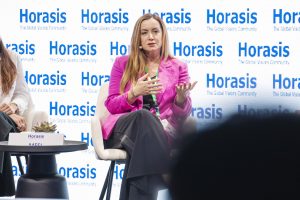
Senida Mesi, Former Deputy Prime Minister of Albania
He said he would thus concur fully with Hulya Gedik, and hope that the new trading corridors opening from the UAE will provide a sustainable humanitarian future. Nayef Alhajraf, Chairman, Capital Asset Management, former Secretary General Gulf Cooperation Council, former Minister of Finance, Kuwait agreed that the COVID pandemic began as a health issue and few realized how widespread its ramifications have been across the globe that now are being tackled with considerable difficulty through the new geoeconomics and politics. He noted that the GCC has a strong mediating role to play, if not an active one on developing its trading routes and partners for the future. Inevitably distant partners like the US, the EU and China feature highly in their discussions. Mishal Kanoo, Chairman, The Kanoo Group, UAE is a local man, born and bread in Dubai. However, he achieved his academic strengths in the US reading Theology and Philosophy with a double major in Economics, then an MBA in Finance. Understandably, he is an advocate of education and his guiding philosophy is a deep belief in honesty and looking ahead in life. Presently, through his involvement in his family’s business and others he is well placed to take action in the current economic turmoil – believing individual endeavor can make a difference.
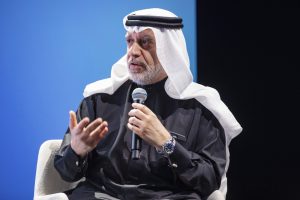
Mishal Kanoo, Chairman, The Kanoo Group, UAE, one of the meeting co-chairs
The second plenary discussed Value Enhancements from Supply Chains fitted nicely into the host DP World’s Global Freight Summit. The location of DP World’s Jabal Ali port was discussed by Murat Seitnepesov, President, Greater Caspian Association, Switzerland who considered how the greater Caspian Region benefited from both this large port with access to a large air freight hub, and industrial zone, and investment park. There are considerable geopolitical pressures on the region that creates pressure on supply chain value enhancement. Political stability would, to say the least, be more than helpful for local and global trade. Claude Béglé, Chairman, SymbioSwiss, Switzerland concurred, stating all parties in a given supply chain must trust each other beyond contractual words so as to smooth over and solve small niggling issues before they created formal problems. Kowing and understanding personally the people involved was important – as is the growing confidence in face-to-face meetings post-COVID.
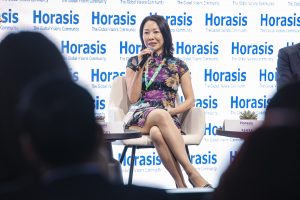
Veronica Shim, Founder, E-Alliance, Singapore
Roger King, Founder and Chairman, ODS Holdings Inc., Hong Kong brought a wider view, linking academia with supply chain operators. The former might have neat theories, but they often lack exposure to practical issues. The operators tend to think the academics too esoteric – and thus he, Roger King, has been said to be a ‘company doctor’ bringing both sides to a greater understanding of the underlying forces: “given supply chains span the globe they are subject to many cultural and political pressures”. Most global supply chains are supported by just a few major shipping lines, often family owned. Veronica Shim, Founder, E-Alliance, Singapore said “Asian clients don’t start succession planning early enough. Many times, their focus is on making money; after all, no one expects to be gone the next day!” Thus, to avoid major disruptions in the (few) supply chain operators it is incumbent on the owners to think seriously about success, and guarding their family businesses. She hinted that “life is more than just money.”
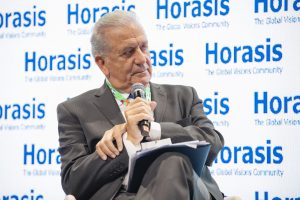
Dimitri Avramopoulos, Former EU Commissioner, Former Minister of Foreign Affairs, Greece
Away from Supply Chains per se, Manoj Gursahani, Co-founder, Vera Healthcare Technologies, India emphasized that modern technologies are important and are served by supply chains. He illustrated how his firm are at the forefront of using AI to detect early signs of diabetes and diabetes-related conditions. Just as Veronica Shim said “life is more than just money.” This plenary was chaired by Oscar Wendel, Editor-at-Large, MEA Finance Magazine, UAE who has noted “that Central Bank Digital Currencies (CBDC) are a misnomer. The Central Bankers are trying to confuse people with the acronym, saying the digital aspect is new. We have had Bank Digital Currencies (BDCs) for decades. The digital aspect is nothing new.” Therefore, during the next banking crisis, people could easily shift their funds to the central bank system, leaving traditional banks to “switch off the lights” and effectively cease to exist. He argues, it is important to have a sufficient number of banks. The value of small banks lies particularly in community banks that operate in local areas.
Towards the evening, we heard a plenary discussion upon Building Asia’s Infrastructure with G2G Partnerships chaired by Jennifer Nadel, Director of Compassionate Politics, CCARE, Stanford University, USA who is known for her moderations that balance diverse perspectives into actionable insights especially about women’s voices and compassionate leadership that are at the heart of global transformations. There are many facets of the G2G partnerships right from individuals though corporations to governments, mediated by many operators. Mahesh M Gandhi, President, AFII Capital, Germany informed us how Pay-per-Click models (PPC) secure public ownership of national assets while unlocking capital from public and private sources. This innovative approach bridges funding gaps and reduces consumer costs, offering sustainable solutions for emerging economies. The PPC model was also supported by Senida Mesi, Former Deputy Prime Minister of Albania, Albania who urged greater support for Albania’s infrastructure and accepted the PPC model’s value in retaining public ownership while lowering consumer costs.
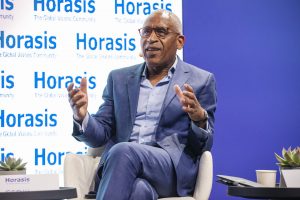
Baron Woolley of Woodford, Member of the House of Lords, UK, making a point durinig the Opening Plenary
A similar approach was noted by Sumit Sinha, UAE Resident Representative, India Exim Bank, UAE who emphasized the Bank’s role in supporting global infrastructure projects executed by Indian contractors. Shisir Khanal, Former Minister of Education, Science and Technology of Nepal, Nepal also viewed PPC as a natural progression for Nepal’s infrastructure financing methods. But before this can take-off, we must improve our school education and thus the education of all our people. There is a huge problem in the quality from the primary schools to the basic school level, but by taking advantage of the geographical location of Nepal, it can become an international education hub. With the vision of building that hub- “it is necessary to create an environment that can bring in foreign students instead of us sending students abroad.”
Rosalía Arteaga Serrano, Former President of Ecuador, Ecuador stressed the importance of mitigating risks and corruption while mobilizing private investments. Which was echoed by Luis Castiglioni, Former Vice President of Paraguay, Paraguay who said he was strengthening of the absolute respect of human rights values anywhere in the world. And so Paraguay has declared a war against international crime, to drug trafficking, to arms dealing, to contraband, to the laundering of assets and money.
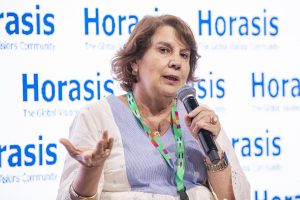
Rosalía Arteaga Serrano, Former President of Ecuador, Ecuador
These aspects were a part of the success stories of G2G partnerships transforming Paraguay’s infrastructure landscape. Summarizing many panelists, Jiang Sun, Acting Head Abu Dhabi, Asian Infrastructure Investment Bank (AIIB), UAE stressed that our investments should focus on mobilizing capital for what we call the “Infrastructure for Tomorrow” – infrastructure with sustainability at its core. At the end of the day, it is the commitments that guide us towards the paths that we prefer, not our connections.
Preity Üpala, Founder, The Omnia Institute, India chaired this final plenary on Managing the Complexities of Change. The panel members were looking towards Asia where entrepreneurs are facing rapid changes. They agreed the pandemic had forced a rapid retrenchment, yet global demand rejuvenated demand with new supply chains and AI leading some corporates within regulation changes; attitudes also changed.
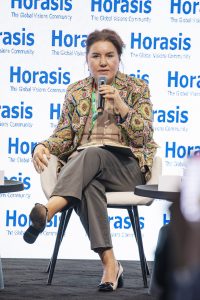
Hulya Gedik, Chair, Gedik Holding, Türkiye
Nguyen Quang Huan, Chairman, Halcom, Vietnam opined that “we must respect partners, and competition should be for development instead of eliminating each other.” He stated he had always attempted to build his company based on an East-meet-West business culture.
Vinod Sekhar, Chairman, Petra Group, Malaysia explained how he was taught as a biologist, but grew as an entrepreneur with wide ranging pursuits. Agreeing with Nguyen Quang Huan, Datuk Vinod believes strongly in social capitalism, creating enterprises that are run as profitable ventures while doing the right thing for employees, customers, society and the environment, ensuring sustainable wealth creation and equitable income generation. Also, in a ‘small roots system’, Royston Braganza, Chief Executive Officer, Grameen Capital, India attempts to finance sustainable development goals through technology, by the measurement the results so creating a results-based approach.
This might be illustrated through not building a hospital but paying for a good health outcome. He espouses a total ecosystem approach – considering that everyone is connected, and therefore we need to work together. Shan Li, Chairman, Silk Road Finance Corporation, China takes a global view. The Silk Road Finance Corporation (SRFC) was created to access investment opportunities opened up by the Belt and Road Initiative.
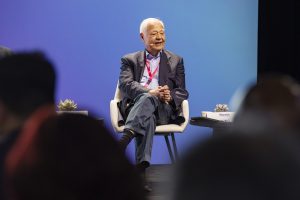
Roger King, Founder and Chairman, ODS Holdings Inc., Hong Kong speaking about supply chains
China’s leading think tank focused on the Belt and Road Initiative, the Silk Road Planning Research Center, is our strategic partner and provides consultation. He hopes he is a catalyst for long-term, commercial and sustainable economic development along the Belt and Road.
Nasser Munjee, Chairman, Tata Motor Finance, India began his career as one of the first employees of HDFC, India’s first housing finance company. Then he was request by the Indian Finance Minister to set up an infrastructure finance company, which became the Infrastructure Development Finance Company Limited (IDFC”. He continues, with Tata, to look favorably upon financing for changes that will be of benefit to the community.
And rounding off the discussions on change and complexity, Spiro Pappas, Chairman, Atlas Iron, Australia is very pleased to have received a global recognition for enterprise safety “achieving the WELL Health-Safety Rating means a safer, healthier, and more satisfying work environment for employees, with clear benefits such as reduced health risks, improved wellbeing, and a positive workplace culture,” it reinforces our commitment to our employees’ health and safety.
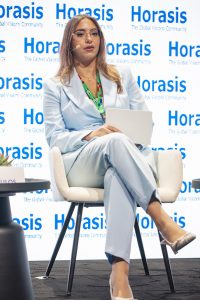
Tala Michel Issa, Senior Reporter, Arabian Business, UAE, chairing the plenary on economic outlook
We are proud in Atlas, to look after our employees: larger corporations tend to treat their projects and even staff, as numbers. Here at Atlas, we don’t, and they actively contribute to change.
Preity Üpala, concluding the panel’s discussion noted that within the present global demographic decline her aim is to empower women, to help them discover themselves, that they may see more clearly the path which they are on, and the road they are to take to reach their final destination, reaching their highest goals… we all depend on the women of the world, especially Asia, to blossom and become stronger in these times of change.
Increasingly over this year I think there is a promising future for Asia. It does not stop there; the region can become the world’s economic powerhouse.
I hope that the Horasis Asia Meeting will continue to serve as an important platform for stimulating thought and creative solutions.
As you read the key points and recommendations presented in this report, we welcome your thoughts and suggestions as we prepare the programme for the next Horasis Asia Meeting.
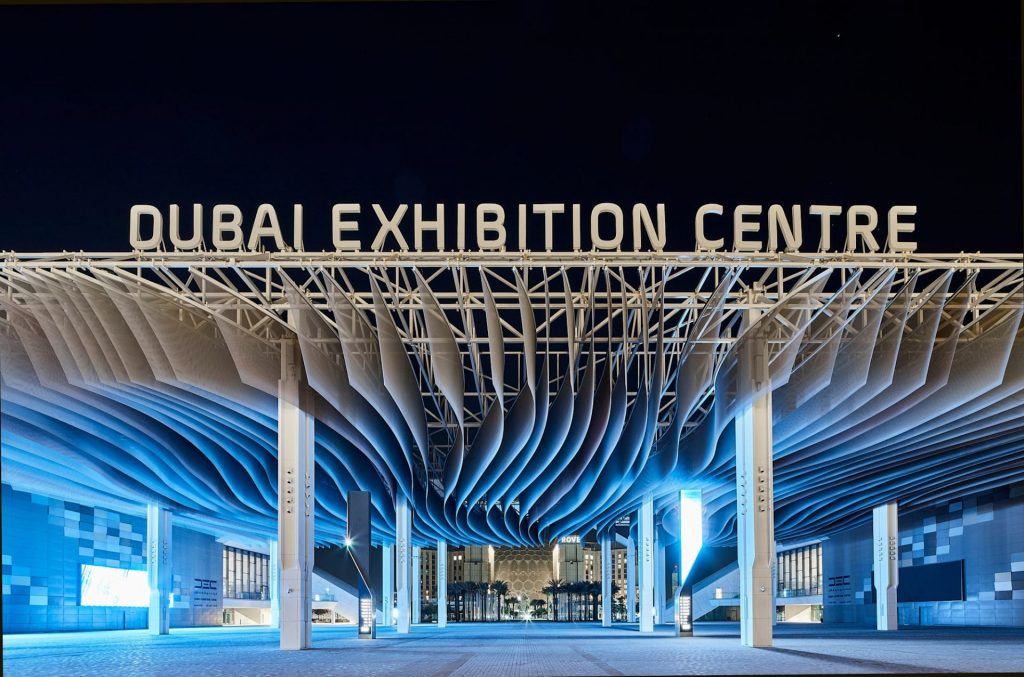
Dubai Exhibition Center – venue of the Horasis Asia Meeting

